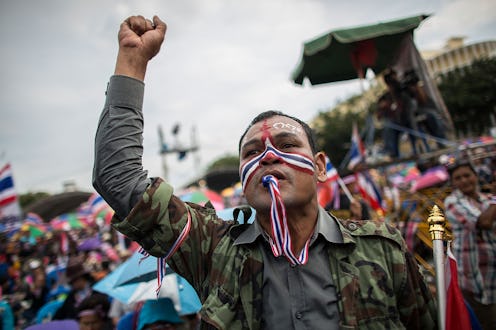News
Thai Anti-Government Protests Turn Violent
A week of mostly peaceful protests suddenly turned violent in Thailand Saturday, when gunshots were fired as pro- and anti-government demonstrators clashed in the capital — at least one person has been confirmed dead and two more have been wounded in the unrest. Meanwhile, further adding to the increasing tension, the Thai government has called over 2,000 military personnel from the navy, air force and army to help protect the government buildings that have been occupied by protestors since the beginning of the week.
The unrest began when a bunch of students attacked a bus carrying pro-government activists to the stadium at which they've been holding rallies to support the government for the last week. The crowd reportedly threw stones at the bus and went after it with sticks, after which they also smashed through the windshield of a cab full of people in red shirts (a sign of pro-government support).
Later, in circumstances that remain unclear, shots were fired amid the violence, and the BBC reports one person dead. Another two were injured; one student who was shot in the thigh, and another man who was hit in the back.
The clashes come after a week of generally non-violent demonstrations aiming to oust Thai Prime Minister Yingluck Shinawatra. On Friday, over a thousand anti-government protestors stormed the national army headquarters and cut off electricity to the city's police headquarters. Since Monday, scores of demonstrators have occupied the Finance Ministry, and still more took over the Department of Special Investigations (essentially the Thai version of the FBI). In another push Saturday, anti-government protestors began piling sandbags in an attempt to climb over the barriers protecting Government House, and are vowing to take over the prime minister's offices by Sunday.
"About 2000 protesters of students network were trying to pressure the police," said National Police spokesman Piya Utayo. "We have information that there will be efforts to escalate violence in several areas," he said.
The protests began last month, after a controversial political amnesty bill — widely seen as a measure to enable the return of former Prime Minister Thaksin Shinawatra (Yingluck’s brother), who was ousted in a military coup in 2006 — passed the lower houses of Parliament. Though the protests reached their peak last Sunday, when over 100,000 people stormed the streets of Bangkok, the demonstrations continue to gather momentum — in spite of the fact that Yingluck easily survived a no-confidence vote in parliament on Thursday and subsequently urged the protestors to negotiate with the government. (The issuing of an arrest warrant against protest leader Suthep Thaugsuban — a former deputy prime minister and legislator for the opposition party — rather undermined her pleas and served to fuel the protestors’ skepticism. ) So far, the officials have been careful to tread delicately on the situation, fearful of a repeat of the 2010 military crackdown on protestors that left over 90 people dead. Saturday's tension, however, and the calls for military aid, raise the possibility of history repeating itself.
